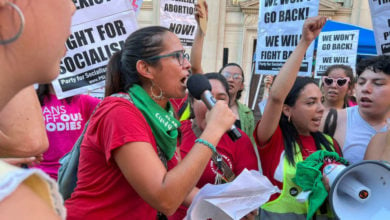April 1 marked the 40th anniversary of a protest against the “Roxbury Murders” of 1979. A crowd of 1,500 met in the Boston Common to protest the murders of seven Black women that had taken place over a three-month span in the Roxbury and Dorchester areas. As the crowd memorialized the seven victims, news arrived of an eighth. By May, the number of Black women murdered in the area climbed to 12. The mainstream media outlets failed to cover any of these murders.
Much of the organized response to the murders was carried out by Boston’s Combahee River Collective, a Black socialist feminist organization remembered today for its pioneering work in drawing connections between capitalism, racism and women’s oppression. In addition to organizing the April 1 protest, the CRC created a pamphlet entitled Six Black Women: Why Did They Die? which was circulated on the streets, at the protest and beyond. The pamphlet challenged readers to analyze the systemic conditions that make Black women more vulnerable to violence on account of both race and gender:
“In the Black community the murders have often been talked about as solely racial or racist crimes. It’s true that the police and media response has been typically racist. It’s true that the victims were all Black and that Black people have always been targets of racist violence in this society, but they were also all women. Our sisters died because they were women just as sure as they did because they were Black.”
Another tragedy in Boston
The rampant violence against Black women across the country and locally in Boston is not a relic of the past. In late February, 23-year old mother Jassy Correia was found brutally murdered days after being abducted from a Boston nightclub while she celebrated her birthday. Some responses to Correia’s murder focused on what she and her friends could have done to prevent the tragedy. Such responses, intentionally or not, place responsibility on the victims of such crimes, rather than on the men who commit them and the society which enables them.
One proposed solution to the issue of violence against Black women is for “men to protect their women.” However, the idea that any men are inherently women’s “protectors” reinforces the misogynist idea that women are weak and need to be protected.
Under capitalism, there is massive economic inequality, and women (particularly women of oppressed nationalities) are disproportionately represented among the unemployed and poor. Working class women are therefore frequently forced to financially rely on men. This economic hierarchy — combined with deep-seated misogyny — makes women more prone to experience domestic and other forms of horizontal violence at the hands of men in their communities. According to a 2015 study by the Violence Policy Center, Black women are two and a half times more likely to be killed by men than white women are. In other words, Black women are often killed by Black men, as appears to have been the case for Jassy Correia.
The struggle for Black women’s liberation continues
The prevalence of gendered violence and other forms of bigotry within our communities raises difficult challenges for the Black liberation struggle. As Black socialist feminists, the CRC offered a framework of how to advance our liberation struggle without either excluding the most vulnerable members of our communities or forsaking those who have internalized oppressive ideologies. In the 1977 Combahee River Collective Statement, members wrote:
“Although we are feminists and Lesbians, we feel solidarity with progressive Black men and do not advocate the fractionalization that white women who are separatists demand. Our situation as Black people necessitates that we have solidarity around the fact of race… We struggle together with Black men against racism, while we also struggle with Black men about sexism. We realize that the liberation of all oppressed peoples necessitates the destruction of the political-economic systems of capitalism and imperialism as well as patriarchy.”
We must recognize that while white supremacy is a primary barrier to the freedom of Black people, it is not an isolated system. We will misunderstand, and even participate in each other’s oppression without an analysis of how patriarchy, capitalism and white supremacy are intricately woven into society and into each other. Socialists and feminists within the Black community combat misogyny and predatory behavior because it is a matter of life and death for Black women.
Black personhood is anything but a monolith, so the Black liberation struggle cannot advance with a monolithic understanding of oppression. Only an anti-sexist, anti-racist revolutionary socialist movement can win Black women our collective liberation; a future free of exploitation and violence!
The Combahee River Collective’s pamphlet Six Black Women: Why Did They Die? can be found here.






